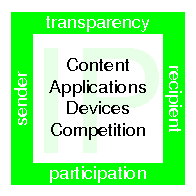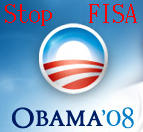It does seem to clarify some of the points made by the panelists.
Category Archives: Public Policy
More Liveblogging from NANOG Net Neutrality Panel
Question from a provider: VoIP traffic prioritization from essentially our own service?
Moderator: One thing that won’t be allowed is prioritizing your own service over someone else’s similar service; that’s almost the whole point. FCC person: This is contemplated in the document. Existing services wouldn’t have to be reworked rapidly. Seeking input. Reasons to be concerned. Monopoly over last mile has a position to differentially treat such a service. This is one of the core concerns.
Q: Giving the same priority to somebody else’s similar VoIP service is essentially creating a trust relationship; how much traffic will the other service provider send? Continue reading
Liveblogging from NANOG Net Neutrality Panel
A huge number of comments have been received already, by Jan 15 deadline. More comments are solicited. See also openinternet.gov.
The general idea is to take six proposed principles and turn them into rules that are enforceable and not unreasonable:
The first four principles have been around for several years. The last two, nondiscrimination and transparency, are the same as the ones Scott Bradner’s petition recommended back in June 2009. Back then I mentioned as I always do that the FCC could also stop talking about consumers and talk about participants. Interestingly, their slide at this talk did not use the word “consumer”, so maybe they’ve gotten to that point, too.Proposed Rules: 6 Principles
- Access to Content
- Access to Applications and Services
- Connect Devices to the Internet
- Access to Competition
- Nondiscrimination
- Transparency
The FCC is also making a distinction between broadband and Internet. There are existing rules regarding “managed” vs. “specialized services” for broadband Internet access, but for net neutrality in general, maybe different rules are needed. Continue reading
Internet, Not Broadband, for National Policy
 A national broadband policy is what you get when you put bellheads in charge.
Fortunately, Scott Bradner has been on the Internet since the beginning,
and explains the difference.
A national broadband policy is what you get when you put bellheads in charge.
Fortunately, Scott Bradner has been on the Internet since the beginning,
and explains the difference.
Broadband is not the Internet. Broadband is shorthand for a diverse class of wired and wireless digital transmission technologies. The Internet, in contrast, is a set of public protocols for inter-networking systems that specifies how data packets are structured and processed. Broadband technologies, at their essence, are high-capacity and always-on. The essence of the Internet is (a) that it carries all packets that follow its protocols regardless of what kinds of data the packets carry, (b) that it can interconnect all networks that follow those protocols, and (c) its protocols are defined via well-established public processes.It’s a petition. Please sign it.There’s risk in confusing broadband and Internet. If the National Broadband Plan starts from the premise that the U.S. needs the innovation, increased productivity, new ideas and freedoms of expression that the Internet affords, then the Plan will be shaped around the Internet. If, instead, the Plan is premised on a need for broadband, it fails to address the ARRA’s mandated objectives directly. More importantly, the premise that broadband is the primary goal entertains the remaking of the Internet in ways that could put its benefits at risk. The primary goal of the Plan should be broadband connections to the Internet.
-jsq
PS:
Therefore, we urge that the FCC’s National Broadband Plan emphasize that broadband connection to the Internet is the primary goal. In addition, we strongly suggest that the Plan incorporate the FCC Internet Policy Statement of 2005 and extend it to (a) include consumer information that meaningfully specifies connection performance and identifies any throttling, filtering, packet inspection, data collection, et cetera, that the provider imposes upon the connection, (b) prohibit discriminatory or preferential treatment of packets based on sender, recipient or packet contents. Finally, we suggest that the Internet is such a critical infrastructure that enforcement of mandated behavior should be accompanied by penalties severe enough to deter those behaviors.While you’re at it, urge the FCC to stop talking about “consumers” and start talking about participants.
USPS Bubble Pop
Just as General Motors has in effect subsidized Big Oil by continuing to build gas-guzzlers in recent years, so has the USPS continued to subsidize Big Mail by shaping its operations to encourage what it now calls, revealingly, “standard mail”—that is, advertising junk mail. Most American citizens are blissfully unaware of the degree to which USPS subsidizes U.S. businesses by means of the fees it collects from ordinary postal customers. For example, if you wish to mail someone a large envelope weighing three ounces, you’ll pay $1.17 in postage. A business can bulk-mail a three-ounce catalog of the same size for as little as $0.14.And the USPS’s own “standard mail” is about to pop. It’s worse than you probably think. An article well worth reading.USPS management claims that “standard” mail makes lots of money, that the USPS makes a better margin delivering a “standard” mail package for $0.14 than it does a first-class one for $1.17. Why? Supposedly because of efficiencies produced by bulk-mail, machinable, zip-plus-four and zip-plus-nine standardization schemes. If you look at the revenue stream from advertising mail, it does look impressive, and it has been growing (for perverse reasons we’ll come to in a minute). But when you juxtapose next to that revenue stream the enormous transactional costs of maintaining a riotously complex rate structure to service it, you quickly reach a different conclusion: Standard mail, the costs of which are also generally tax-deductible for businesses, does not make money. It amounts to a corporate subsidy, which helps to explain why Congress, insofar as its members understand this, typically doesn’t object to the status quo. After all, these corporations have been known to contribute to electoral campaigns.
Actually, it’s worse than that. Not only are pennies shaved off the postage affixed to grandma’s letters routed directly into the pockets of direct-mail marketers, some 20 percent of direct-mail advertising volume is comprised of credit card, mortgage and other financial offers. So yes, the USPS has contributed in a subtle yet very real way to our burst economic bubble.
Lessig’s Herculean Holiday Present: Reboot the FCC
 Here’s a good test for the new U.S. Executive: to recognize that
steady pragmatism means radical change, starting with the FCC:
Here’s a good test for the new U.S. Executive: to recognize that
steady pragmatism means radical change, starting with the FCC:
The solution here is not tinkering. You can’t fix DNA. You have to bury it. President Obama should get Congress to shut down the FCC and similar vestigial regulators, which put stability and special interests above the public good. In their place, Congress should create something we could call the Innovation Environment Protection Agency (iEPA), charged with a simple founding mission: “minimal intervention to maximize innovation.” The iEPA’s core purpose would be to protect innovation from its two historical enemies—excessive government favors, and excessive private monopoly power.Lessig gets the connection with his old topic of intellectual property and copyright. Those are monopolies granted by the federal government, and they have been abused by the monopoly holders just like the holders of communication monopolies: Continue reading—Reboot the FCC, We’ll stifle the Skypes and YouTubes of the future if we don’t demolish the regulators that oversee our digital pipelines. By Lawrence Lessig, Newsweek Web Exclusive, 23 Dec 2008
Users Revolted: Net Neutrality to Win
 The world has turned upside down:
The world has turned upside down:
This column is dedicated to the top managers of American business whose policies and practices helped ensure Barack Obama’s victory. The mandate for change that sounded across this country is not limited to our new President and Congress. That bell also tolls for you. Obama’s triumph was ignited in part by your failure to understand and respect your own consumers, customers, employees, and end users. The despair that fueled America’s yearning for change and hope grew to maturity in your garden.She identifies Apple as one of the few companies that has actually gotten it about how to do business, with its iPod and iTunes. As we’ve previously seen, this is because Apple gets it that Porter’s Five Forces model of competition breaks when open distribution channels are introduced.Millions of Americans heard President-elect Obama painfully recall his sense of frustration, powerlessness, and outrage when his mother’s health insurer refused to cover her cancer treatments. Worse still, every one of them knew exactly how he felt. That long-simmering indignation is by now the defining experience of every consumer of health care, mortgages, insurance, travel, and financial services—the list goes on.
Obama’s Victory: A Consumer-Citizen Revolt, The election confirms it’s time for sober reappraisal and reinvention within the business community. If you don’t do it, someone else will, By Shoshana Zuboff
It appears that Mark Anderson, Odile Richards, and William Gibson were right: “See-bare-espace… it is everting.” Cyberspace just elected a president of the United States. And he knows it.
Obama has been publicly in favor of net neutrality for at least a year. And he has not backed off. He’s put Susan Crawford and Kevin Werbach in charge of reviewing the FCC. Now that’s cyberspace inverted indeed!
Amnesty Foes 2.0: SenatorObama-PleaseVoteAgainstFISA
 I’ve been waiting for this to hit the bigtime, and it has, it’s been slashdotted:
I’ve been waiting for this to hit the bigtime, and it has, it’s been slashdotted:
ya really notes a blog posting up at Wired reporting that foes of the Telecom Amnesty Bill have mounted a campaign on Barack Obama’s own website. Though the group was created only days ago, on June 25, it has grown to be the fifth largest among 7,000 such groups, just short of Women for Obama. Although it is widely known that Obama changed his stance from opposing telecom immunity to supporting it, many have not given up hope of getting him to switch once again.And today the group has more than 9,000 members and is #2 among all MyBO groups.Telecom Amnesty Foes On the Move, Posted by kdawson, slashdot, on Tuesday July 01, @08:02AM from the one-week-and-counting dept.
It’s everywhere else, too, Time, WSJ, Wired, Huffington Post, TPM, DailyKos, MyDD, OpenLeft, digg, reddit, and of course facebook. Read all about it on the wiki.
(Yes, I’m a member of the group, since about the second day, and here’s what I think about the issue.)
This group is a goldmine of information about which telecoms gave what money to whom.
The most significant part to me is that people are using a candidate’s own organizing tools to attempt to organize the candidate. Not stopping there, either, attempting to organize allies for the candidate. Obama claims to be people-powered. Let him say that while other politicians follow money from lobbyists, he listens to the people who give him money, who are the people, and when they said think again he did, and discovered the bogus House FISA “compromise” bill is no such thing, and now he’s against it. We’ll see.
-jsq
Online Everyone: The Internet for Everyone, a new public/private coalition
It’s Google’s involvement in the deal that makes the new coalition something to keep an eye on. The company has expanded its Washington DC lobbying group significantly in the past few years.Access, choice, openness, innovation: yes, those are the points (plus speed), without being weighed down by the albatross of the clunky “net neutrality” malnym.“When you have a public interest community up against a massive industrial sector like the cable and telco companies, you’re going to likely fail because of the corrupted political system where money buys influence,” said Silver. “However, if you can align the public interest with major industrial sectors that also have an increasing influence in Washington, then you have something formidable, then you actually can beat the cable and phone cartel, and this is going to how its going to play out.”
— Net Neutrality Advocates Call For Fast, Universal Access To The Net, By Sarah Lai Stirland, Wired, June 24, 2008,
-jsq
PS: Free Press: if you’re going to put a video up front, pick a fluent public speaker such as Robin Chase or Jonathan Zittrain to show first, eh? “Collective hallucination,” yes!
Not for Sale: Canadian Internet
 Net neutrality has become a political issue in Canada,
where a small and very polite rally occurred in Ottawa the other day.
Net neutrality has become a political issue in Canada,
where a small and very polite rally occurred in Ottawa the other day.
p2pnet news | Freedom:- Today is the day Canadians are gathering in Ottawa to tell the federal government what they think about Net Neutrality and bandwidth throttling.Bell Canada was suffering under the delusion it could choke down accounts paid for by some of its customers, wrongly claiming they’re responsible for bandwidth congestion.
— Canadians rally for Net Neutrality, P2Pnet news, 27 May 2008
-jsq
